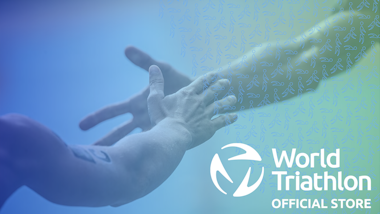Olympic Odyssey: Start Your Engine
12 March, 2008
Former world number one Chris Hill takes us to Beijing through the athletes eyes
Its an Olympic year and you know what that meansOlympic focus. Every analysing eye is trained on every athlete, and every trained athlete has an eye for the Olympics; the one event in triathlon, that counts more than any other.
You can pick a World Cup by peering above. There will be blue sky hopefully, and also one or two media helicopters. This is standard World Cup avionic mathematics. When an athlete hears helicopters from above and their attendant rotor blade-drone, its a signal to fire adrenalin in preparation for whats ahead.
In this way, the helicopter signals game on for an athlete. From Mooloolaba to Madrid; Des Moines to Vancouver, one or two helicopters mean big business for the competitors in each of the 15 or so World Cup races each year.
So, what about those events with more than two helicopters, say, the events with three or four of those buzzing bees above? This event is called the World Championship and it is run only once every year.
For the athlete compressed and sweating in a neoprene wetsuit or nervously shivering without one, this louder buzzing overhead is real reason to start shaking. More noise upstairs means more expectation, and with more expectation comes more pressure.
The annual World Championships mean bigger business for the competitors on the world circuit. Now everyone is racing in country colours, patriotic pride is at the forefront and a world title is on the line at the finish.
Obviously, there is heightened emotion. Every athlete, whatever their real chances are, would love to walk away with a World Championship win to their name. Thats because a World Championship title can turn a good career into a great one.
It can attract sponsors that were previously waiting and seeing and it can improve athletes confidence ten fold afterwards. Its a big deal to the athletes who compete, the nation they compete for and to the sport of triathlon as a whole. Its also noisy overhead.
Thats all fine, World Cups and World Championships are all big events and all very noisy as well.
But what about that rarest of birds, the one that flies only once every four years; the event at the pinnacle of the triathlon pyramid, which every other event exults as mere steps on the way; the one event that truly catapults the sport of triathlon into the worlds consciousness, and where helicopters dot the sky in a plaguethe Olympics?
The Olympics are the top step of the pyramid. And what makes this so unique is that due to a pyramids inherent qualitiesits pointy top and diminishing sidesthere is only standing room for one man and one woman each Olympic cycle.
The rarity adds to the allure, and the allure of winning must be rapturous. We probably wouldnt know this, lest for the smiles and happy tears of the victors on the highest podium in sports. Photos of Brigitte McMahon, Simon Whitfield, Kate Allen and Hamish Carter can verify this.
If a World Cup means big business and World Championships mean bigger business, then the Olympics are the biggest business. The Olympics can vault an athlete from obscurity into the small club of triathlon Olympic oligarchy. It can make hollow careers brim with successdrenched in gold and it can make grown men cry.
Triathlon at the Olympics has a prominent place in the sport and as a race it has never disappointed. The Swiss McMahon tasted gold first at Sydney in 2000 pipping hometown sweetheart Michellie Jones by a whisker.
The crowd assembled on the Sydney Opera House steps would have jeered the result if they werent so happy just to be there; love struck by the mere fact they really had won the Olympics and even better, it was all happening right before their eyes.
No, the Sydney spectators werent unhappy with the result because silver still shines and there was the mens race the next day to make gilt-edged amends. The fact that it didnt happen and an Aussie didnt win a medal was of small consequence because Sydney and Australia felt they could claim Canadian Simon Whitfield because he went to school there for a time.
On the podium Whitfield did not concede and sing the Australian anthem but the crowd didnt mind as they were still reeling from the supreme display of sprinting he showed against the grinning German silver medalist, Stefan Vuckovic, who could not have been happier with his silver medal if it was gift wrapped.
Both Sydney races had been won by athletes who were reasonably obscure prior. Whitfield had started to show promise with World Cup podiums and McMahon had placed second in the test event that Olympic year.
Being triathlons first Games inclusion the expectation for Sydney was high and it delivered in droves: the athletes, the organisation, the spectators, the volunteers and the weather. It was all floorless and encompassed in Sydney. This baton of success was passed to Athens.
Athens in 2004 produced similarly gripping races. Australian world-beater Loretta Harrop, almost beat the world in the second triathlon at the Olympics. She led the last lap of the bike and for 9.9km of the run until Australian born Austrian Kate Allen stole her Olympic thunder in a boilover.
The fact the race was such a close run made it all the more dramatic. At the same time it started to appear that drama was the fuel of triathlon at the Olympics.
Hamish Carter made it his mission to break this mould the next day. In the extreme Athens heat and on the extreme Athens course, Carter made his move to the line one kilometre out. This was an ambitious decision by the Kiwi.
And as we found out, Carter was too canny; he had seen Olympic medals come down to the wire and was not going to make this one close. Besides, if he blew up, fellow New Zealander Bevan Docherty would clean up for the country in his place. Carters victory surge paid off and the Kiwis claimed gold and silver.
That small history brings us to Beijing and the third Olympics. It also brings us the promise of more of the same detectable Olympic duelling; where close runs link arms with famous victories. It all awaits in August 2008.
So Beijing, fuel up the helicopters, and start your engines.

Former world number one Chris Hill brings his unique elite athlete perspective in weekly Olympic columns to ITUs website, triathlon.org. He competed on the ITU World Cup circuit, winning three titles and ten medals in total. He was crowned the overall World Cup series champion in 2001. That same year he was silver medalist at the ITU World Championships in Edmonton, Canada. Watch for Chris Hills column, Olympic Odyssey every week on triathlon.org.
tags
itu





